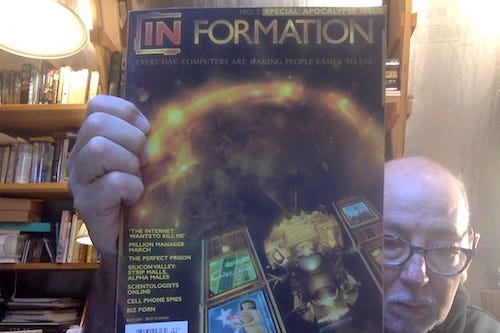Marc Andreesen was going to debug the internet or die trying
Technotopia and its discontents, a preamble
Marc Andreessen’s revealed scripture
You can be forgiven for not knowing that Marc Andreessen is venture capitalist who started his professional life as a computer programmer in Illinois several decades ago, co-wrote Mosaic (the web browser that effectively launched the World Wide Web), moved to Silicon Valley, California, co-founded a couple of companies and made a ton of money when those companies were acquired, and then used that ton of money to go on to make several additional metric fucktonnes of money by investing in Silicon Valley companies like Facebook and Twitter when those companies were little teeny-tiny affairs.
He’s a billionaire, naturally. And evidently a libertarian too. Because of course he is.
When bitcoin and ‘crypto’ came along, Andreessen’s venture capital fund pioneered the fine art of securities-fraud-at-one-remove, pumping and dumping cryptocurrency ‘shitcoins’ in an evidently legal but transparently sleazy fashion1, thereby adding great wads of fiat to his already enormous pile of dough.

And now, following a well-trod path, Marc Andreessen has become the newest version of that tired cliché, the Silicon Valley techno-libertarian who has found all the answers to everything and now feels compelled to share them with us.
Like Joseph Smith revealing the Golden Plates of the angel Moroni, a few weeks ago Andreessen published The Techno-Optimist’s Manifesto to widespread acclaim and derision.
Which, if you want to read Andreessen’s so-called manifesto, be my guest. As I’ve mentioned in a few prior posts I’m basically irreligious, so I haven’t so I haven’t looked at the Manifesto yet — though I know I’ll soon have look at it soon, for reasons given further below. However I have enjoyed reading some take-downs of the thing, which we’ll also get to in a bit.
Opening lines from a clear blue sky
Blue Sky is a new social media thing much along the model of Twitter to which I, along with several tens of thousand of refugees from Elon Musk’s hellsite, have decamped.
Blue sky nice enough as these things go — ‘nice, like chicken salad’ as a long-ago fiancée of mine used to say — but as Lloyd Bentsen might say if he were substacking today, ‘I knew Twitter. Twitter was a friend of mine. And Blue Sky, you’re no Twitter.’
Anyway, there was this thing going round the other day over there on Blue Sky where people would post variations on famous lines — usually opening lines, but not always — from canonical literary works as commentaries on current events.
I first encountered this meme in the variation (below) on the first lines The Iliad, which was offered by Blue Sky participant ‘flowerhorne’ as a commentary on the clown show put on by the Republican Party in their quest to find a suitable Speaker for United States House of Representatives.
Flowerhorne’s variation on a theme by Homer includes the variation on closing lines of a poem by Yeats that was posted by the Blue Skyer ‘eilatan’ :
As the ‘rework famous opening lines to make a comment on current events’ meme caught on, many people offered variations on Shirley Jackson’s legendary opening to The Haunting of Hill House, as ‘brenton’ does here (below) (on top of a shout-out from Kristen Miller to Virginia Woolf’ novel Mrs Dalloway):
As the meme reached critical mass, variations on ‘This is just to say,’ were, of course, inevitable, for reasons I’ve already discussed:
My own contribution to this Blue Sky literary talent show was
“Marc Andreessen was going to debug the internet or die trying.”
I still think that that was pretty awesome but I’m afraid that the allusions sailed over many heads.
At Swim-Two-Squirrel-Brains
Speaking of sublime first openings to novels, here is how Flann O’Brien opens his profound comic masterpiece At Swim-Two-Birds :
Having placed in my mouth sufficient bread for three minutes’ chewing, I withdrew my powers of sensual perception and withdrew into the privacy of my mind, my eyes and face assuming a vacant and preoccupied expression. I reflected on the subject of my spare-time literary activities. One beginning and one ending for a book was a thing I did not agree with. A good book may have three openings entirely dissimilar, and inter-related only in the prescience of the author, or for that matter one hundred times as many endings.
Space doesn’t allow me to go into all the thoughts that ramify in my squirrel-brain noodle from this paragraph, but I mention one of them briefly under the next heading.
I will get to some of the other ramifications in a followup post real soon now.
Kermode-O’Brien literary-theoretical food fight
Here at Sundman figures it out!, finding later benefactions of significance is what we’re all about, so we now direct you attention to our earlier discussion from Sundman’s Awful Mistake: the stunning conclusion, wherein we quoted our current favorite literary theorist Frank Kermode, from his book The Sense of an Ending: Studies in the Theory of Fiction:
In a novel the beginning implies the end: if you seem to begin at the beginning, ‘It was a fine evening in 1922. I was at a notary’s clerk in Marommes,’ you are in fact beginning at the end; all that seems fortuitous and contingent in what follows is in fact reserved for a later benefaction of significance in some concordant structure.
I adore everything about At Swim-Two-Birds and (as faithful scholars of Sundman figures it out! know well by now) I’m kind of obsessed with Kermode’s book. So let me just here put down a marker that O’Brien’s postulate that A good book may have three openings entirely dissimilar, and inter-related only in the prescience of the author, or for that matter one hundred times as many endings would seem to be at odds with Kermode’s assertion that [i]n a novel the beginning implies the end.
I have put this apparent contradiction into the cogitator. I expect that we have not seen the last of it.
In Formation and the Cults of Silicon Valley
The second instantiation of David Temkin’s In Formation magazine, the Special Apocalypse Issue, dates from the year 2000. Articles include “The Internet wants to Kill Me,” “Biz Porn,” and “Silicon Valley: Strip Malls, Alpha Males.” If you’re thinking “Hey, In Formation sounds kind of like it was written as a lampoon of Marc Andreessen and The Techno-Optimist Manifesto, but written twenty three years before Andreessen published his little Ayn Randian screed, it’s fair to say that you get it.

Now, after a hiatus of more than two decades, a third (and final?) issue of In Formation is in the works, and I am very happy to be able to share with you that I’ve been commissioned to write a piece for it on religions and cults of Silicon Valley. I haven’t finished writing my essay yet — okay, okay, I haven’t even started writing it — but I am very confident that you’re going to love it. Stay tuned.
Cheerio for now; a substack bug has cut me off
Substack has a bug such that if you add a ‘share’ button after your post has reached a certain (nowhere specified) length, the button is added but is not shown your the draft. So you may think that your first attempt to add a ‘share’ button didn’t work and add a second one, and so on, and on, as Jonathan Swift might say, ad infinitum. If there’s a way to delete such buttons, I haven’t figured it out.
So now I’ve added at least one such button to this post and have run out of space to tie up a half-dozen loose ends, such as what the Kermode and O’Brien observations on the beginnings and endings of novels have to do with In Formation magazine, Such threads shall remain ‘hanging,’ as Agadmator might say, like undefended pieces on a chessboard, until such time as I come back to resolve them.
See also Cory Doctorow’s thorough explanation of how a crypto pump-and-dump operation works.








Let it not be forget that Andresson left Champaign-Urbana without the source code for Mosaic (unless Jim Barksdale sent him off for intensive memory training, maybe) and clean roomed it into the Netscape Browser, creating the first unicorn 🦄 of the Internet Age and getting his grubstake. So, it wasn’t intellectual property theft, rather just an ordinary ripoff. Of a land grant university funded by the State of Illinois and support by the US government. By one of its graduate students. Who might have had a stipend that supported him when he was working on Mosaic. Reminds me of the joke about the libertarian complaining that he couldn’t jump the triage queue at the ER by just using his Platinum card.
Little known fact: the magnus.conf file for http/https servers is named for the UI server that hosted the backend that Mosaic sent its requests to.
Also the Odyssey quote is from the excellent Emily Wilson vernacular blank verse translation:
Tell me about a complicated man.
Muse, tell me how he wandered and was lost
when he had wrecked the holy town of Troy,
and where he went, and who he met, the pain
he suffered in the storms at sea, and how
he worked to save his life and bring his men
back home. He failed to keep them safe; poor fools,
they ate the Sun God’s cattle, and the god
kept them from home. Now goddess, child of Zeus,
tell the old story for our modern times.
Find the beginning.